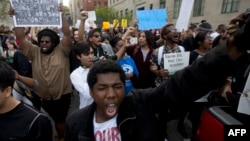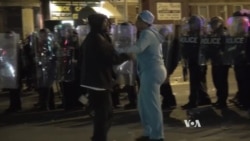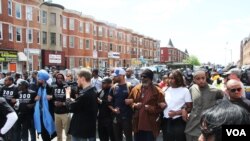More than 1,000 demonstrators marched through downtown Baltimore on Wednesday in what Police Commissioner Anthony Batts called an "extremely peaceful" protest demanding more justice for African-Americans.
The crowd marched from the city's main train station to City Hall and back again. Police said they fully expected everyone to heed the city's overnight curfew.
Other marches were held in Washington, Boston and New York City, where police arrested demonstrators who tried to disrupt downtown traffic.
Maryland Governor Larry Hogan declared Baltimore safe Wednesday, following two nights of demonstrations sparked by the death of a young African-American man in police custody. Commuters packed buses and subways, and public schools reopened. The Baltimore Symphony Orchestra played a free outdoor concert.
But the Baltimore Orioles and Chicago White Sox played a baseball game in an empty stadium. Police said they needed to deploy elsewhere in the city and could not provide enough security at the game.
Violence erupted Monday after the funeral for Freddie Gray, 25, who suffered a still-unexplained severe spinal injury while in police custody. He had been arrested and thrown into a police van; officers drove him to jail without securing him with a seat belt as required, and they allegedly ignored his pleas for medical attention.
The six officers involved in the arrest are on paid administrative leave while the investigation proceeds. Police plan to turn the results of their investigation over to the state's attorney's office Friday, who will then decide whether to charge the officers with a crime.
The U.S. Justice Department and the FBI also are conducting a civil rights investigation into Gray's death.
After the funeral, rampaging crowds poured into the streets, with protesters burning stores and nearly 150 cars and looting a shopping mall. Police arrested 235 people; 20 officers were injured.
But many protesters said the violence was not just about Gray, but about what they called the habitual poor treatment of blacks by police and the city's alleged unwillingness to do anything about it.
They also said they were angered by what they saw as a lack of economic power, something they said has persisted for decades in black neighborhoods.
The situation was calmer from Tuesday night into Wednesday morning, the first night of the seven-hour overnight curfew that will remain in effect all week. Police made 35 arrests. Officers and National Guard troops dispersed protesters, even as some of the protesters jeered and threw bottles at them.
Obama weighs in
In a Wednesday interview with talk-show host Steve Harvey, President Barack Obama said the Baltimore rioting showed that police departments need to build more trust in black neighborhoods. He said his heart went out to Baltimore police who were injured in trying to quell Monday's unrest, in which police cars and neighborhood stores were set afire and businesses were looted.
Obama praised Baltimore officers for showing "appropriate restraint" and said there was "no excuse" for the rioting.
But the American leader also urged police departments throughout the U.S. "to hold accountable people when they do something wrong."
He said urban unrest and protests against police actions — often with white police officers dealing harshly with black suspects in street confrontations — would continue if the response was only to retrain police. He said national action was needed to confront underlying issues — poor education, limited job opportunities and drug use.
"We put [police] into communities … where young people think it's much more likely they're going to prison than going to college," Obama said. "You've got communities that have been disinvested for years. If you send police officers into those situations, where the drug trade is the primary economy and you say your job is to basically contain that … then it's not surprising that you end up with a situation of enormous tension between those communities and those police officers.
"We're not going to change this overnight," Obama concluded. "It requires focus."
The top U.S. law enforcement official, new Attorney General Loretta Lynch, deplored the Baltimore violence, saying it was "counterproductive to developing a respectful conversation" about improving the relationship between police and the communities they serve.
City residents of all races came out Tuesday to clean up, pick up and shed tears for burned-out stores and the looted shopping mall. As the sun set Tuesday, streets that had been filled with rioters 24 hours earlier were instead filled with music, dancing and people hugging.
WATCH: Related video report by Victoria Macchi
Mayor Stephanie Rawlings-Blake spent much of Tuesday visiting neighborhoods. She said she saw a lot of what Baltimore is about — people reclaiming and healing the city.
Some residents took food and water to the police officers patrolling their streets. VOA's Victoria Macchi reported that after a brief clash broke out in one part of town, protesters stepped in to form a line between police and angry demonstrators.








